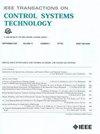三相振动能量收集器的多目标矢量控制
IF 4.9
2区 计算机科学
Q1 AUTOMATION & CONTROL SYSTEMS
引用次数: 0
摘要
在振动能量收集技术中,需要通过反馈控制使随机干扰产生的平均功率最大化。在大规模应用中,使用三相转换技术进行转换通常具有优势。在这种情况下,矢量控制技术可用于优化控制直交正交参考框架中的转换器电流,作为反馈测量的动态函数。在这种模式下,转换能量通过正交电流得到最佳控制。只有当机器的内部反向电动势(EMF)超过电源总线的电压时,才会使用直流来维持对正交电流的控制,这种技术被称为场削弱。由于定子线圈中的耗散增加,相对于理论上更大的母线电压,使用磁场削弱会导致功率转换率降低。解决过电压问题的另一种方法是在正交电流控制器的优化过程中加入一个竞争目标,以减少过电压事件的频率和持续时间。然而,由于需要满足竞争约束条件,这也会导致发电功率降低。本文探讨了这两种过电压补偿方法之间的权衡,并说明了确定这两种方法之间最佳平衡的方法。本文章由计算机程序翻译,如有差异,请以英文原文为准。
Multiobjective Vector Control of a Three-Phase Vibratory Energy Harvester
In vibration energy-harvesting technologies, feedback control is required to maximize the average power generated from stochastic disturbances. In large-scale applications, it is often advantageous to use three-phase conversion technologies for transduction. In such situations, vector control techniques can be used to optimally control the transducer currents in the direct-quadrature reference frame, as dynamic functions of feedback measurements. In this paradigm, converted energy is optimally controlled via the quadrature current. The direct current is only used to maintain control of the quadrature current when the machine’s internal back electromotive force (EMF) exceeds the voltage of the power bus, a technique called field weakening. Due to increased dissipation in the stator coil, the use of field weakening results in a reduction in power conversion, relative to what would theoretically be possible with a larger bus voltage. This overvoltage issue can be alternatively addressed by imposing a competing objective in the optimization of the quadrature current controller such that the frequency and duration of these overvoltage events are reduced. However, this also results in reduced generated power, due to the need to satisfy the competing constraint. This article examines the tradeoff between these two approaches to overvoltage compensation and illustrates a methodology for determining the optimum balance between the two approaches.
求助全文
通过发布文献求助,成功后即可免费获取论文全文。
去求助
来源期刊

IEEE Transactions on Control Systems Technology
工程技术-工程:电子与电气
CiteScore
10.70
自引率
2.10%
发文量
218
审稿时长
6.7 months
期刊介绍:
The IEEE Transactions on Control Systems Technology publishes high quality technical papers on technological advances in control engineering. The word technology is from the Greek technologia. The modern meaning is a scientific method to achieve a practical purpose. Control Systems Technology includes all aspects of control engineering needed to implement practical control systems, from analysis and design, through simulation and hardware. A primary purpose of the IEEE Transactions on Control Systems Technology is to have an archival publication which will bridge the gap between theory and practice. Papers are published in the IEEE Transactions on Control System Technology which disclose significant new knowledge, exploratory developments, or practical applications in all aspects of technology needed to implement control systems, from analysis and design through simulation, and hardware.
 求助内容:
求助内容: 应助结果提醒方式:
应助结果提醒方式:


